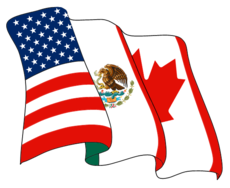 -my choice is Mexico, my main points to focus on: Immigration that basically, the main group are the Mexicans who came to the U.S. to work, how it started, why it started, when it started, on a source that i found on jstor.org says that migration started during the Chinese exclusion, when the Americans were looking for new employees that could work as a replacement. It's been said that it began at th beginning ot the 20th century.
-my choice is Mexico, my main points to focus on: Immigration that basically, the main group are the Mexicans who came to the U.S. to work, how it started, why it started, when it started, on a source that i found on jstor.org says that migration started during the Chinese exclusion, when the Americans were looking for new employees that could work as a replacement. It's been said that it began at th beginning ot the 20th century.
 |
| [map that shows the territory that one day belonged to Mexico] |
-the Mexican-American war, that occurred from 1846 to 1848, which caused the annexation of Texas and other territories, on that war was involved Antonio Lopez De Santa Anna (dictator) .
 -NAFTA: is an agreement signed by the governments of Mexico, the united states and Canada, [but as my research paper is based on the relationship between Mexico and the U.S., I'm gonna exclude Canada]
-NAFTA: is an agreement signed by the governments of Mexico, the united states and Canada, [but as my research paper is based on the relationship between Mexico and the U.S., I'm gonna exclude Canada] The agreement became validated in january, 1, 1994.
It was signed by the leaders of ech of these three countries during that time, from the U.S president George W. bush, mexican president Carlos Salinas, and canadian prime minister Brian Mulroney.